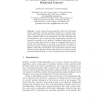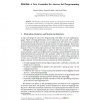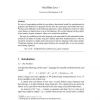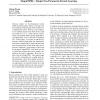236 search results - page 27 / 48 » Learning Teleoreactive Logic Programs from Problem Solving |
114
Voted
ECML
2006
Springer
15 years 5 months ago
2006
Springer
Abstract. Greedy machine learning algorithms suffer from shortsightedness, potentially returning suboptimal models due to limited exploration of the search space. Greedy search mis...
110
Voted
LPNMR
2007
Springer
15 years 8 months ago
2007
Springer
We describe a new grounder system for logic programs under answer set semantics, called GrinGo. Our approach combines and extends techniques from the two primary grounding approach...
109
Voted
ICALT
2008
IEEE
15 years 8 months ago
2008
IEEE
This paper presents the adaptation model used in NUCLEO, a pilot e-learning environment that is currently being developed at the Complutense University of Madrid. The NUCLEO syste...
132
click to vote
APAL
2008
15 years 2 months ago
2008
We solve a longstanding problem by providing a denotational model for nondeterministic programs that identifies two programs iff they have the same range of possible behaviours. W...
132
Voted
ICML
2009
IEEE
16 years 3 months ago
2009
IEEE
Previous studies of Non-Parametric Kernel (NPK) learning usually reduce to solving some Semi-Definite Programming (SDP) problem by a standard SDP solver. However, time complexity ...




